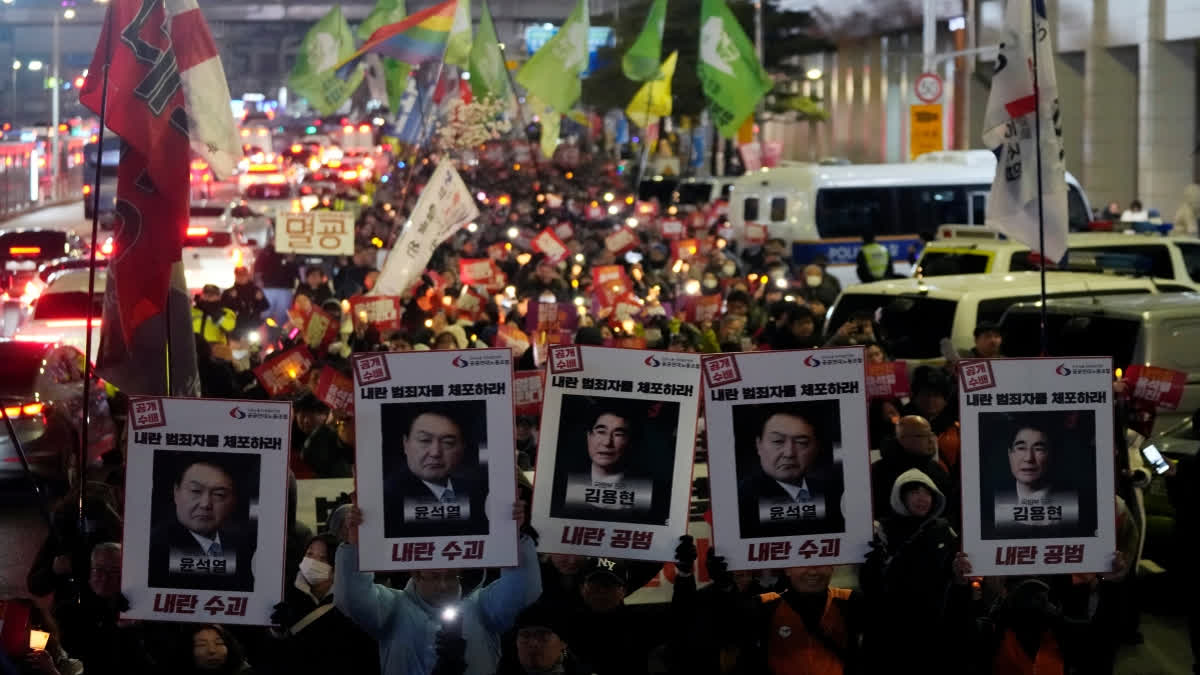Tokyo: South Korean President Yoon Suk Yeol is facing possible impeachment for sending heavily armed soldiers into Seoul's streets with a baffling declaration of martial law that reminded many of the country’s past military-backed dictatorships.
Lawmakers began impeachment proceedings against Yoon just hours after parliament unanimously voted to cancel martial law, forcing the president to lift his order about six hours after it began. Opposition parties are pushing for a vote on Saturday on the impeachment motion, which needs support from two-thirds of the National Assembly to advance to the Constitutional Court, which would decide whether to remove Yoon from office.
In a surprising turnaround, the head of Yoon's governing party expressed support for suspending the president's powers, making Yoon’s impeachment more likely.
Here’s what to know about the situation:
Will Yoon be impeached?
Opposition parties are pushing for a parliamentary vote on Yoon’s impeachment on Saturday, calling his short-lived martial law declaration an “unconstitutional, illegal rebellion or coup.” But with 192 seats in the 300-member National Assembly, they need support from some members of the president’s conservative People Power Party to get the two-thirds majority required to pass the impeachment motion.
In a striking reversal, PPP leader Han Dong-hun called on Friday for an immediate suspension of Yoon’s official duties, increasing the chances of impeachment. Han said he had received intelligence that Yoon had ordered the country’s defense counterintelligence commander to arrest key politicians on accusations of “anti-state activities” during the brief period of martial law.
Yoon also faces rising popular pressure to step down. Thousands of protesters have marched in the streets of Seoul since Wednesday, and thousands of autoworkers and other members of the Korean Metal Workers’ Union, one of the country’s biggest umbrella labor groups, have started hourly strikes since Thursday. The motion to impeach Yoon can be put to a vote between Friday and Sunday. A new motion can be submitted later if the current one fails or expires.
If Yoon is impeached, he would be suspended until the Constitutional Court decides whether to remove him from office. Prime Minister Han Duck-soo, who holds the No. 2 position in the government, would take over presidential responsibilities. The Constitutional Court currently has three vacancies due to retirements, and six votes are required to remove the president from office. The Democratic Party is expected to speed up the process of exercising its right to recommend two of the three new justices.
What is martial law?
South Korea’s constitution gives the president the power to use the military to keep order in “wartime, war-like situations or other comparable national emergency states.” Imposing martial law can include things like suspending civil rights such as the freedom of the press and assembly and temporarily limiting the powers of the courts and government agencies.
The constitution also gives the National Assembly the power to lift the declaration with a majority vote. Lawmakers rushed to the building as soon as they heard of Yoon's declaration late Tuesday. Some climbed the walls to evade the military cordon so they could assemble a quorum. Their vote to lift the order was 190-0 including 18 members of Yoon's party.
The impeachment motion alleges Yoon imposed martial law far beyond his legitimate powers and in a situation that did not meet the constitutional standard of a severe crisis. The constitution also doesn’t allow a president to use the military to suspend parliament. The motion argues that suspending political party activities and deploying troops to seal the National Assembly amounted to rebellion.
